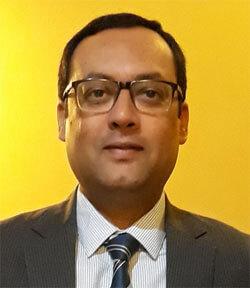21st Century has opened up ample new opportunities for students, and at the same time, it has given a lot of new challenges for them.
The skills and knowledge that today’s world needs and expects from students have drastically changed from a couple of decades ago. Students need to keep up with the current modern markets’ lightning-pace. They need to keep up with the 21st-century skills, without which they can’t be successful and will be left behind. Looking at the rapid economic and social change, schools have to prepare students for careers that have not yet been created, technologies that have not yet been invented and problems that we don’t yet know will arise.
 So, what do educators, education leaders and schools need to do to help students meet the 21st century needs? In order to help educators and schools better prepare students for college, career, and job in today’s ever-changing, fast-paced environment, here’s an interview with Mr. Samit Dayal, Vice President- Education, FranklinCovey India & South Asia, to discuss the importance of 21st century skills and how it is a vital foundation for students’ success. Below is the excerpt from the interview:
So, what do educators, education leaders and schools need to do to help students meet the 21st century needs? In order to help educators and schools better prepare students for college, career, and job in today’s ever-changing, fast-paced environment, here’s an interview with Mr. Samit Dayal, Vice President- Education, FranklinCovey India & South Asia, to discuss the importance of 21st century skills and how it is a vital foundation for students’ success. Below is the excerpt from the interview:
- In your opinion, what are the essential skills for student success in the 21st century?
Today’s markets and employers demand a lot from students and the workforce. While some skills for any job remain the same, today’s students and working youth need to acquire a lot newer skills to be employable and successful—both in their personal and professional lives. Some of the essential skills include Critical Thinking, Creativity, Collaboration, Communication, Problem Solving, Initiative, Self-Discipline, Global Awareness, Flexibility, Social-Emotional Learning, Relationship Building, Public Speaking, Technology Literacy, Time Management, and Goal Achievement, among others.
- How can schools better prepare students for college, career, and life-readiness? What must school leaders do differently?
Educators and school leaders have a huge responsibility to better prepare students for college, career and life-readiness. They need to go beyond academics alone to create well-rounded learners by developing the whole person and preparing students to become life-ready leaders —meaning they can lead their own lives and also lead others by working well in groups/teams. Educators have the opportunity to rethink education and create a school culture where students are empowered to lead their learning and imbibe 21st century skills and apply them in school & home on a daily basis. Bringing the best to education in any school requires, the partnership of educators, parents and students—this is a new way of thinking. I am a firm believer of the See-Do-Get Cycle, which means when you change the way you See things, it influences what you Do and the results you Get.

- What are the key challenges facing educators in 21st-century skill development?
In this 21st century, learning is no more restricted to classroom lecture strategy. Education has evolved and progressed so much in recent years, bringing in different notions of learning, classrooms, curriculum, pedagogies, skills, and the overall system, all aimed at catering better and practical learning to students. At the same time, students and parents expect much more in this digital era. Educators today are expected to look beyond the ordinary and adapt different pedagogy styles that don’t just appease students but imbibe various intellectual, psychological and social skills.
The changing learning environment and expectations require educators to pace up too. Some of the key challenges facing educators in 21st-century skill development include personalization, use of right technology, classroom management, curriculum design, lack of funding, lack of access to resources and training, lack of parental support and changing educational trends, among others.
- Can 21st-century skills be taught in the context of core academic subjects? How can we successfully embed technology and 21st-century skills into the existing curriculum?
The integration of 21st-century skills in the curriculum is beneficial and necessary to prepare students for their future careers. In an era where students’ outcomes determine the schools’ success, it is crucial to allow students create and use technology to support the necessary skills and learn in unique ways. Integrating core academic knowledge, critical thinking, and social skills in teaching and learning can help students master the multi-dimensional abilities required in the 21st century. Integrating cognitive learning and skills into the curriculum, leads to deeper understanding of the subject and solving complex problems in the real world, in real-time. When children see that their learning is about their lives now and today, they become engaged in the process.
Researchers recommend adopting a 21st-century curriculum will blend knowledge, thinking, innovation skills, media, Information and Communication Technology (ICT) literacy, and real-life experience in the context of core academic subjects. In this way, students will be prepared with the necessary knowledge and life skills to be successful in their careers. Adopting a connected curriculum with the real world can support student participation, motivation, and understanding of academic subjects and prepare them for adult life. Researchers have also pointed out that curriculum should allow students to learn and develop various literacies such as civic, financial, environmental, health, and global awareness. Multi-literacy could enable students to make informed decisions that prepare them for challenges in the global community and succeed in the workplace. The researchers further stated that in the 21st-century curriculum, educators must integrate over 75% of future skills, which should be both part of the school curriculum and integral to the academic content.